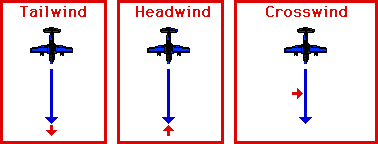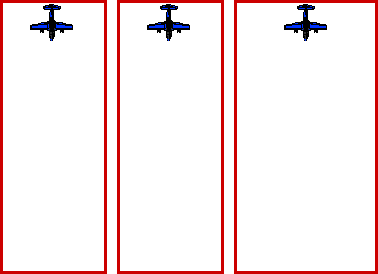The Plane and The Wind
Observe the three planes in the animation below. Each plane is heading south with a speed of 100 mi/hr. Each plane flies amidst a wind which blows at 20 mi/hr. In the first case, the plane encounters a tailwind (from behind) of 20 mi/hr. The combined effect of the tailwind and the plane speed provide a resultant velocity of 120 mi/hr. In the second case, the plane encounters a headwind (from the front) of 20 mi/hr. The combined effect of the headwind and the plane speed provide a resultant velocity of 80 mi/hr. In the third case, the plane encounters a crosswind (from the side) of 20 mi/hr. The combined effect of the headwind and the plane speed provide a resultant velocity of 102 mi/hr (directed at an 11.3 degree angle east of south). These three resultant velocities can be determined using simple rules of vector addition. In the case of the crosswind, the Pythagorean Theorem and SOH CAH TOA are utilized to determine the magnitude and the direction of the resultant velocity.


For more information on physical descriptions of motion, visit The Physics Classroom Tutorial. Detailed information is available there on the following topics:
Vectors
Vector Addition
Resultant
Pythagorean Theorem and SOH CAH TOA
Riverboat and Relative Velocity Problems